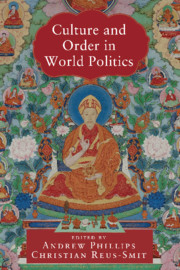Book contents
- Culture and Order in World Politics
- LSE International Studies
- Culture and Order in World Politics
- Copyright page
- Contents
- Additional material
- Contributors
- Preface
- Part I Introduction
- Part II Historical Orders
- Part III The Modern ‘Liberal’ Order
- Part IV Constitution and Contestation
- 10 Universal and European
- 11 The Jewish Problem in International Society
- 12 Recognizing Diversity
- 13 Gender, Nation and the Generation of Cultural Difference across ‘The West’
- 14 Governing Culture ‘Credibly’
- Part V Conclusion
- References
- Index
12 - Recognizing Diversity
Establishing Religious Difference in Pakistan and Israel
from Part IV - Constitution and Contestation
Published online by Cambridge University Press: 25 December 2019
- Culture and Order in World Politics
- LSE International Studies
- Culture and Order in World Politics
- Copyright page
- Contents
- Additional material
- Contributors
- Preface
- Part I Introduction
- Part II Historical Orders
- Part III The Modern ‘Liberal’ Order
- Part IV Constitution and Contestation
- 10 Universal and European
- 11 The Jewish Problem in International Society
- 12 Recognizing Diversity
- 13 Gender, Nation and the Generation of Cultural Difference across ‘The West’
- 14 Governing Culture ‘Credibly’
- Part V Conclusion
- References
- Index
Summary
Using the international recognition of Israel and Pakistan as case studies, the chapter probes the terms of recognizability in the modern liberal order, asking how religion became a recognizable criterion for sovereign statehood. It digs below the workings of the post-1945 diversity regime, arguing that, epistemologically, religion came to be knowable within the dominant frame of ‘nation’, but in the process it would become increasingly hollowed out and emptied of content, while simultaneously be tied to the thick, essential idea of collective belonging. Viewing the recognitions of Israel and Pakistan in the contexts of their imperial pasts, and analysing the two international commissions that shaped their statehood, the chapter shows how emerging modes of cultural recognition built on and sedimented very particular versions of 'religion' and funnelled certain aspects of social, political, and cultural life into coherent, representable, and recognizable forms of religious difference. By looking in detail at the epistemological politics of cultural diversity, the chapter exposes the costs that come with the diversity regimes’ recognition of cultural difference.
Keywords
- Type
- Chapter
- Information
- Culture and Order in World Politics , pp. 250 - 270Publisher: Cambridge University PressPrint publication year: 2020



